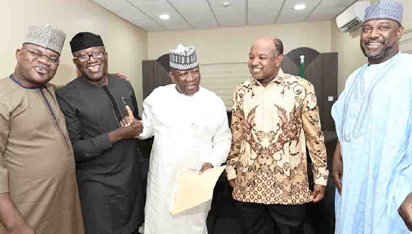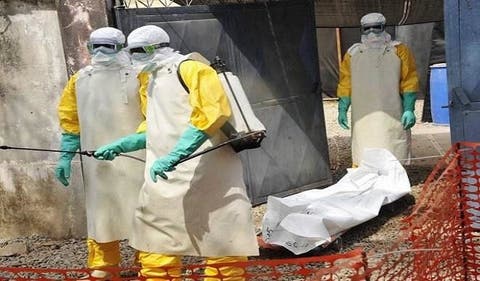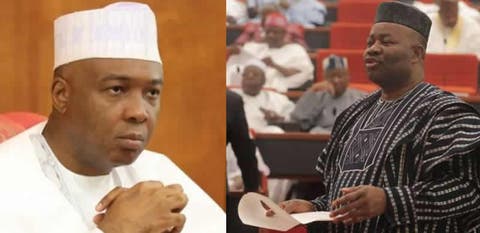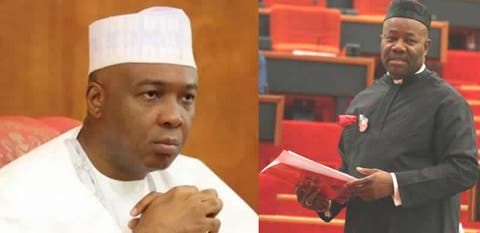THE thirty- Six (36) state governors under the aegis of Nigeria Governors’ Forum, NGF said Thursday that they were not in any way opposed to new minimum wage for workers in the country.

Governors Forum meeting: Director General, Nigeria Governors’ Forum (NGF) Asishana Okauru, Kano state Governor, Dr. Abdullahi Ganduje, Governor of Ekiti State Dr. Kayode Fayemi and Logo state Governor, Yaya Belly, during Governors Forum Meeting in Abuja yesterday.
Photo by Gbemiga Olamikan
Rising from a meeting in Abuja Thursday, the governors who noted that the Organised Labour was right to agitate for salary increase, however said that their concern is the ability to implement it and pay, adding that the problem was not just about agreeing to a figure, but the availability of resources to meet up with the commitment.
Speaking to Journalists after the meeting in Abuja, governor of Zamfara State and Chairman of NGF, Abdulaziz Yari stressed that with the present minimum wage at N18,000, many states were struggling to pay with some of them already hugely indebted.
The Organized Labour is asking for N30,000 whereas the government is offering N24,000.
Yari said: “Like we said, we can do minimum wage on any amount we need but the issue is the ability to pay the minimum wage agreed in the last meeting which the Minister of Labour attended with the negotiation committee and also the committe that we also set up.
“We made it clear that we are not against the upward review of salary, we are in tandem with the NLC to get the minimum wage reviewed but the problem we are having is the capacity to pay what is agreed .
“As at today, most of the states are struggling to pay the N18,000 minimum wage. Some states are paying between 35 to 50% of the minimum wage and some states are owing salary arears.
“If we say we are going to do an upward review of the minimum wage, it is not about only reviewing it but how we are going to get the resources to cater for it.”
">Lago Governors Forum meeting : From left, Lagos State Governor, Akinwumi Ambode chatting with Nasarawa State Deputy Governor, Silas Agara and Edo state Deputy Governor, Rt. Hon. Philip Shaibu during Governors Forum Meeting in Abuja yesterday. Photo by Gbemiga Olamikan
Meanwhile, the National President of Nigeria Labour Congress (NLC), Comrade Ayuba Wabba, was invited to brief the Forum on states’ performance in the use of London and Paris Club refunds.
It would be recalled that the Federal Government disbursed the fund to states with the condition to use larger percentage of the money to pay workers’ salaries.
Speaking further, Yari said, “Also, sometimes ago, London and Paris Club refund was paid and part of the agreement was that we will deal with the issues of workers and it was a serious agreement that we signed with the Minister of Finance and the Federal government that the larger chunk of the money will be channeled to payment of salaries .
“Some states are in the process but one of the conditions critically accepted is to ensure that this funds was utilised acccording to the agreement.
“We invited the National President of the Nigerian Labour Congress to give us a details on how some states have performed. Some states that are not up to date have signed an MOU with the NLC and their representatives in states on how they can overcome the issue of salary arears and that has been done and it will be taken to the CBN so that those states will be paid.”
Also speaking to reporters after the meeting, Wabba who insisted that workers cannot continue to provide services on empty stomach, said that even though Labour was prepared to dialogue on the minimum wage issue, but there is limit to it.
Wabba said: “All through history of minimum wage in Nigeria, it has never been given on a platter of gold. We thought the situation has changed, things have improved, and therefore, through collective bargaining and dialogue, we will be able to reach a compromise.
“If we do that, fine and good. Where that is not done, you should also know that no worker can continue to work on an empty stomach. That has been our message. We will continue to dialogue but there is also a limit to dialogue.”
The NLC boss noted that the challenge in the Nigerian economy especially the eroding of the purchasing power of the worker caused by continuous devaluation of the naira, the exchange rate, the increase in pump price of petrol and electricity tariff, have affected the Nigerian worker.
Wabba who observed that by law, the minimum wage ought to have been reviewed as far back as 2016 as previously agreed, said, “All these factors put together necessitated the NLC and organized Labour to demand for a new minimum wage which is in tandem with best global practice.
“What we are telling the Governors is that the minimum wage is due and everybody must be committed to it, committed to it in the sense that every state was given an opportunity to…when the (negotiation) committee finished its work, we wrote individually to the state governments to send in input.
“Twenty one states responded in writing. Some quoted figures, some said, whatever is agreed, they are going to pay. Some have made statements that they are going to pay.
“So, for anybody to come under a platform and say ‘well, we have issue with that,’ I think the best thing is to go back to their states, put your workers together and say ‘I will not be able to pay. That is what I think is honourable, that is what I think is supposed to be done.”
However, the Labour leader said that he pleaded with the governors that they should understand that the workers must earn a living from their salary as they provide critical services in the system.





